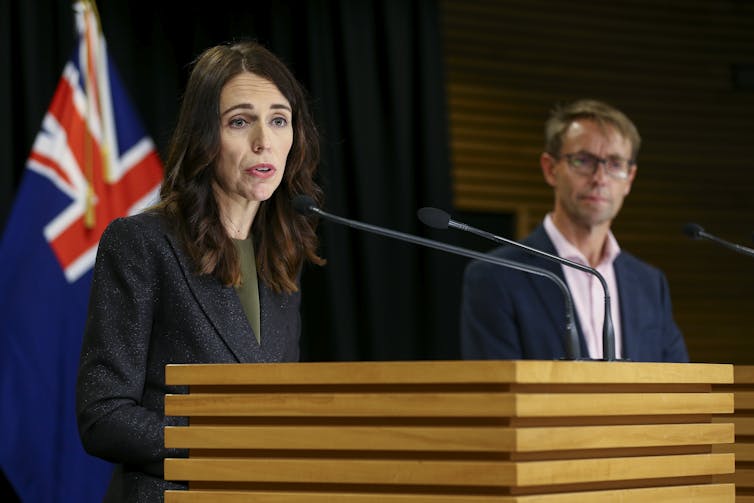The COVID-19 crisis tests oppositions as well as governments. Ahead of New Zealand's election, National risks failing that test
- Written by David Hall, Senior Researcher in Politics, Auckland University of Technology
It isn’t easy being a political opposition in the midst of a crisis. The volatility within New Zealand’s National Party – which has had three leaders in as many months – is a case in point.
Some argue this is circumstantial. The COVID-19 crisis has benefited the incumbent government – or, more precisely, Prime Minister Jacinda Ardern’s Labour Party. Of course, that public support could easily vanish in the event of a mismanaged outbreak, because voters don’t respond to a crisis itself, but to the competency of its handling.
Yet the government appears to have won public confidence – and so, for now, the electoral advantage.
But there is more going on. Under pressure, the opposition risks sabotaging itself by failing in its role as opposition – that is, failing in the duties and responsibilities that accompany this office.
Formally, this role is titled “Her Majesty’s Loyal Opposition”. Her Majesty, of course, refers to Queen Elizabeth II, still officially the sovereign of New Zealand.
The meaning of “opposition” is also intuitive to grasp. As the largest party that isn’t in government, its job is to oppose – to challenge, to test, to needle, to inquire. The opposition ought to hold the government to account.
Opposition is a recent invention
This role hasn’t always existed in parliamentary systems – it was a 19th century innovation. But it enriched democracy by guaranteeing a space for dissent, for formal disagreement with the government of the day.
It meant the losers of the political competition would not be turfed into the wilderness, bitter and disenfranchised. Rather, they would remain in the fold, able to contribute to the political process through confrontation, critique and even collaboration.
This gets us closer to the odd word “loyal”. It implies that the opposition should be loyal to the democratic institutions that protect its right to criticise. It need not take the government line on any issue, but it should be loyal to the rules of the game, precisely so that it can continue playing.
Consider, by contrast, the one-party state, where the losers in the political competition are shut out of public decision-making. In such circumstances, loyalty is pointless. The ruling party only wants to expel or silence detractors, to cancel their voice.
Consequently, the opposition has no duty of loyalty, and instead a strong incentive to influence public decisions by seizing power – by coup, revolt or revolution.
Constructive opposition is the point
In this we see the distinction that political theorist Chantal Mouffe makes between “antagonistic” and “agonistic” politics.
Antagonistic politics are where opposing parties treat each other as enemies, to be vanquished or exiled. With agonistic politics, on the other hand, parties treat each other as noble adversaries, worthy of challenge but also respect.
 Not the crisis but the handling of it: Jacinda Ardern and Director-General of Health Ashley Bloomfield give a regular COVID-19 update.
GettyImages
Not the crisis but the handling of it: Jacinda Ardern and Director-General of Health Ashley Bloomfield give a regular COVID-19 update.
GettyImages
The institution of the loyal opposition facilitates a constructive agonism. As the New Zealand-born political philosopher Jeremy Waldron argues, it instructs the government to assume the loyalty of the opposition, to not treat it as treasonous merely because it voices disagreement.
Meanwhile, the opposition must oppose – but it must do so without burning down the house. Yet the COVID-19 crisis is seriously straining this loyalty.
Read more: Voting is an essential service too. New Zealand can't be afraid to go to the polls, even in lockdown
A dangerous game
It started out well with New Zealand’s Epidemic Response Committee, a cross-party vehicle of agonistic democracy, where the opposition could openly hold the government to account, even under a state of emergency.
But the subsequent leaking of sensitive information for political gain by National Party members betrayed a lack of loyalty to government institutions, and to New Zealanders who entrust them with private information.
Now, the opposition is insinuating that the government publicly withheld information about the present outbreak.
Given how swiftly this coronavirus spreads, and how much the government has to lose from its spreading, it isn’t politically rational for the government to cover it up. It is a cynical suggestion – and the opposition risks that many voters will see it as such.
This is a dangerous game. The opposition is undermining trust at a time when trust is incredibly important. New Zealand’s strong levels of social and institutional trust are a key factor in our relatively successful pandemic response.
Its degradation – a loss of trust in official medical advice, for example, or the authority of lockdowns – diminishes the country’s capacity to fend off COVID-19. It further diverts attention away from more credible shortcomings in New Zealand’s pandemic response, such as contact tracing and quarantine protocol.
A noble calling
And it feeds into the paranoia that crises conjure up. Social media platforms such as Facebook and YouTube are revealing themselves as effective engines of conspiracy and indoctrination – with implications we’re still coming to understand.
Read more: Rogue poll or not, all the signs point to a tectonic shift in New Zealand politics
The opposition’s appeals to paranoia only add more fuel to the online inferno. Yet the electoral gains, if there are any, are liable to spill toward minor parties, such as the New Zealand Public Party, which make conspiracies their forte.
Her Majesty’s Loyal Opposition has a noble function, all the more important in this volatile political moment. Upholding rather than denigrating that office is what will reinvigorate the loyalties of voters.
Authors: David Hall, Senior Researcher in Politics, Auckland University of Technology





